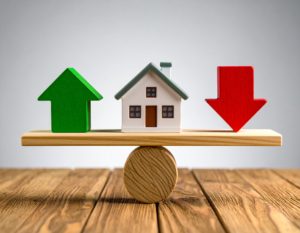Declining home values continue to soften in many parts of New Zealand, yet QV says we are likely to see that rate of reduction both leap and fall in the coming months as a result of reduced sales activity

The QV House Price Index for June 2023 shows the average home decreased in value by 1.8% nationally this quarter, a smaller rate of decline from the 3.4% decrease in quarterly value change experienced back in May. The national average home value is now $891,585, which is 11.8% lower than the same time last year and 5.6% less than at the start of this calendar year.
Quotable Value (QV) operations manager James Wilson commented: “Low sales volumes continue to result in significant volatility in key housing metrics, so we’re continuing to see short-term spikes in monthly value changes around the country. For example, in the recent numbers, Auckland’s rate of softening increased from last month. This volatility is likely to continue for a while yet, with the rate of reduction continuing to leap and fall accordingly, but the stats do continue to suggest that value falls are generally flattening overall.”
The latest QV figures show the average quarterly rate of home value decline has slowed in all but two of the country’s 16 largest urban areas – Hastings (-2.2%) and Dunedin (-3%) – with Rotorua (1.9%), Queenstown (2.9%) and Invercargill (0.2%) recording positive growth for the three months ending 30 June 2023. Values also reduced at a faster than average rate in Auckland (-2.2%), Wellington (-2%) and Tauranga (-2.9%), where the average home has now dropped below $1 million.
Mr Wilson said parts of the country that had relatively low average home values were typically outperforming the more expensive areas, with Queenstown being the obvious exception. “This is a result of who has been most active in the market, with first-home buyers continuing to make up a larger share of the market overall. As a result, a higher proportion of lower priced properties are being represented in sales activity, while investors and ‘movers’ remain generally cautious.”
“Anecdotally we have been hearing reliable reports from real estate agents and our registered valuers around the country that growing numbers of investors are beginning to re-enter certain locations that they view as offering good value for money – but this is not yet a widespread trend while such strong economic headwinds continue to lash the country,” Mr Wilson added.
“We are now well on the cusp of the next refinance wave with many households still having to re-fix at significantly increased mortgage rates. While we haven’t yet seen signs of defaults or mortgages under duress increasing to significant levels of alarm, spending levels and recent data on household savings rates would indicate that belts have been tightened across NZ and more disposable income is being funnelled towards interest servicing. This will maintain downward pressure on the market for the time being, even as increasing demand for housing continues to build up in the background.”

Auckland
Home values continue to fall in Auckland, but there are signs that confidence is starting to build in the residential property market once more.
From May to June, there was little change to the region’s average quarterly rate of reduction. Values decreased by an average of 2.2% in the latest QV House Price Index, compared to a 2.3% average reduction in the previous one.
The average home value in the Auckland region is now $1,241,836. That figure is 13.9% lower than the same time last year, and 7.3% lower than at the start of this calendar year.
Local QV valuer Hugh Robson commented: “The market appears to be showing more stability with some confidence returning. We’re seeing an increase in multi-offers on property, more attendance at auctions, and a slight increase in new listings to the market – but it’s still low.
“The price gap between buyers and sellers’ expectations appears to be closing, but prices remain low generally. It’s still too early to tell if this is a major turn in the market,” he added.
Northland
Kaipara District has proven to be the most resilient of the north throughout the first half of 2023.
Home values in the district have reduced by 2.7% throughout the six months to the end of June to reach a new average of $854,410. That compares to an average reduction of 8.8% so far this calendar year in the Far North ($670,092) and 6.8% in Whangarei ($737,117).
Year on year, home values are on average 11.1% lower across the wider Northland region, with Kaipara (-7.2%) once again holding up stronger than the Far North (-11.3%) and Whangarei (-12%).
Tauranga
Tauranga’s average home value has dropped below $1 million.
The latest QV House Price Index shows the city’s average home value has reduced by 7.2% throughout the first six months of 2023 to reach $998,727. It’s the first time since April 2021 that Tauranga’s average home value has been less than $1 million.
Its quarterly rate of reduction slowed from 4% in May to 2.9% in June, which QV property consultant Derek Turnwald said is another indication that the residential market is close to its low point. “Sales turnover is starting to increase and value declines are decreasing.”
“First-home buyers are realising that the market is reaching the end of its decline and are showing stronger interest. Banks are beginning to relax a little with loan application scrutiny, and as of 1 June the Reserve Bank has relaxed its loan-to-value ratio criteria slightly,” he said.
“Investors are starting to show some interest in the market again, as many of them will also be sensing that the market is close to bottoming out. Although many will still likely wait to see if we have a National government take power later this year to change some of the tax laws that the current government put in place to make investment property ownership less attractive.”
“There has been a recent increase in building company failures and building delays, which is likely to be discouraging some people from undertaking new builds. These people will likely look to purchase from the existing housing stock, leading to an increase in activity,” Mr Turnwald added.
Waikato
The residential property downturn slowed in the wider Waikato region last month.
The region’s quarterly rate of home value reduction lessened from 3.4% at the end of May to 2.6% at the end of June. The average home value – $801,289 – is now 5.1% lower than at the start of this year, and 10.4% lower than the same time last year.
The largest reductions throughout the first six months of 2023 have occurred in Thames Coromandel District (-9.6%), Otorohanga (-5.8%) and Hamilton (-5.4%), with the latter’s quarterly rate of reduction slowing from 2% in May to just 0.2% in June.
QV property consultant Marshall Wu commented: “Sales volumes are significantly lower compared to 12 months ago, which can be attributed to the considerable shift in market sentiment and conditions in that time. Vendors have started to fully comprehend these changes, leading to more realistic price expectations as the gap between asking prices and selling prices narrows down.”
“In the coming months, there is expected to be a significant increase in the number of fixed-rate home loans reaching maturity. The growing trend of borrowers refinancing their loans will provide the market with an improved understanding of their ability to service their debt at substantially higher interest rates,” Mr Wu added.
Rotorua
Rotorua’s residential property market rebounded last month.
The latest QV House Price Index figures show the city’s average home value increased by 1.9% this quarter to $644,325, marking its first quarterly increase since February 2022. That figure is still 4% lower than at the start of this calendar year and 11% lower than the same time last year, with a scarcity of recent sales data making the latest figures more volatile than usual.
QV property consultant Derek Turnwald commented: “Demand for housing is still a bit subdued but it is definitely improving. Open home attendance is reasonably good for well-presented properties without maintenance or consent issues and there is a sense that market sentiment is shifting. The stats this month reflect this with positive change figures for both the one- and three-month periods.”
“Despite predictions of increasing joblessness, the unemployment rate remains relatively low with good job security generally. Many employers have offered good wage rises in the previous three years, which combined with falling house prices, means that home-to-income ratios are now roughly back to where they were pre-Covid,” he added.
Taranaki
Declining home values have slowed across the Taranaki region this quarter.
The latest property figures from QV show that home values have reduced across the region by an average of 0.6% since the end of March – an improvement on the 2.2% quarterly rate of reduction reported in last month’s figures, and the 2% quarterly rate of reduction in the month prior to that.
In New Plymouth, the average home has decreased in value by 1.9% throughout the first half of 2023 to $715,112. In the neighbouring districts of Stratford ($473,690) and South Taranaki ($427,226) home values have diminished by an average of 7.7% and 3.3% respectively since the start of the year.
Hawke’s Bay
The rate of home value decline has remained relatively steady in Hawke’s Bay this quarter.
The average home declined in value by 2.3% to $717,820 this quarter, which is just a fraction of a percentage point more than what was reported in last month’s QV House Price Index. That figure is now 5.3% lower than it was at the start of this year, and 12.8% lower than the same time last year.
In Napier and Hastings, values have dropped by an average of 6.7% and 4.2% respectively throughout the first half of 2023. The rolling three-monthly rate of decline slowed by just 0.4% in Napier and increased by 1.2% in Hastings, indicating that the downturn still has a way to go.
QV Hawke’s Bay manager Damian Hall commented: “The market remains fairly stagnant here in the Hawke’s Bay. Old stock continues to clear, with roughly 30% of sales last month attributed to first home buyers at around the $600,000 price range. Other stock has been pulled from the market due to not being able to reach vendors’ price expectations.”
“Investors are looking but we’re also seeing evidence of rentals being sold, which suggests high interest rates are starting to bite. We’re also seeing flood money coming through now, which is impacting activity at the upper end.”
Palmerston North
Declining home values in Palmerston North continue to slow.
The city’s average quarterly rate of decline improved from a reduction of 2% in April, to a 1.3% reduction in May, and now a significantly smaller reduction of 0.6% in June. The average home value is now $627,103.
Local QV registered valuer Olivia Betts commented: “The overall statistics show the market is still in decline. We continue to see a trend where generally the lower valued properties are still showing negative movements, while the higher valued properties are fairly solid at their current levels. Sales volumes remain at low levels.”
She said infill sections had been the hardest hit by the downturn. “Many areas of the city are now looking mildly financially unappealing to subdivide, due to the fixed cost. Demand for residential property remains subdued generally.”
Wellington
Home values decreased at a relatively consistent pace in the Wellington region last month – but there are signs the market could be stabilising.
Values reduced by an average of 2% this quarter, compared to a 2.6% quarterly deduction reported in the previous QV House Price Index. There was also little difference in the region’s monthly rate of home value reduction, which went from 0.8% in May to 0.7% in June.
The average home value in the region is now $825,554, which is 6.7% less than at the start of 2023 and 17.4% less than the same time last year. The largest reductions this calendar year have occurred on the Kapiti Coast (-8.2%) and Porirua (-8.1%) with Hutt City experiencing the smallest (-4.4%).
Local QV registered valuer Blake Ngarimu said there were clear indications that values are stabilising. “Over the first half of 2023 house values in the Wellington region have experienced a slow and weakening decline. The decline appears to be losing some momentum – particularly due to a lack of stock, with a reported increase in competition between buyers.”
“However, while the Reserve Bank has indicated that the Official Cash Rate would not increase, some banks have implemented a further hike in interest rates which may put a damper on things,” Mr Ngarimu added.
Nelson
Property values continue to ebb away in Nelson, albeit at a discounted rate during the June quarter.
The latest QV figures show that local residential property values decreased by an average of 1.1% during the three-months to the end of June, compared to a 2.4% average reduction recorded during the three-months to the end of May.
The city’s average home value is now $779,468, which is 3.4% lower than at the start of this year and 9.4% lower than the same time last year.
Local QV registered valuer Jane Simpson said there were indications that prices were levelling off in the Nelson and Tasman markets, with increased numbers of prospective buyers at open homes. “First-home buyers are now showing more interest in the property market than earlier in the year. Falling prices have made property more affordable for them, even with higher mortgage rates.”
“Where there is an over-supply of housing, such as modern and new homes in Richmond, prices need to be realistic to achieve a sale. Whereas in the central Nelson market there is a limited supply of properties, alleviating the downward pressure on prices,” she said.
“Many sellers appear to have now accepted the current conditions and are pricing more appropriately to the market. This is in contrast to earlier in the year when a majority of the sellers had expectations that were too high, requiring price cuts further down the line.”
West Coast
Buller continues to largely buck the residential property downturn.
Local home values have increased by 6.6% to reach a new average of $350,823 throughout the first half of 2023, compared to average reductions of 5.9% and 5.6% in Grey ($367,808) and Westland District ($393,592) respectively.
Buller leads the West Coast pack on an annual basis too, with positive home value growth of 7.4% on average, compared to 1.2% growth in Grey, and a 1.9% reduction in Westland.
Canterbury
Christchurch has recorded very small amounts of positive home value growth in consecutive months.
The latest QV House Price Index shows Christchurch’s average home value increased by 0.4% to $730,488 in June. It follows a similarly small increase of 0.8% back in May, with the city’s average rate of decline sitting at 2.8% throughout the first half of 2023, compared to 5.6% nationally.
Local QV registered valuer Olivia Brownie commented: “Christchurch city is holding firm with a flurry of activity over the last month helping to maintain its value levels. The market appears to be showing resilience with the increase in activity counterbalanced by a decline in listings.”
Across the wider Canterbury region, average home values are down 1.3% this quarter and also 2.8% for the calendar year.
“While Christchurch city is levelling out, it appears its neighbouring districts are continuing with a very slow decline. What happens in the months to come will depend on key market drivers in the region. Right now, it appears to be unchanging and flat like the landscape, with more of the same expected in the market over the coming winter months,” Miss Brownie added.
Dunedin
Residential property values continue to track consistently downward in Dunedin.
Home values have decreased across the city by an average of 3% this quarter – the largest decline among the main centres, alongside Napier – which is 0.2% more than what was reported in last month’s QV House Price Index and 0.1% less than the quarterly rate of decline reported back in April. Dunedin’s average home value is now $614,059.
Local QV registered valuer Rebecca Johnston commented: “Dunedin’s number of sales appear to be trending down from previous months. This highlights a tightening of supply versus demand, compared to the past 12 months. Properties requiring maintenance, repairs and upgrades are being viewed less favourably by both buyers and lenders, requiring extended marketing periods. Where immediate maintenance is due, vendors are having to come to the party to achieve a sale.”
She said changes to the current operative district plan with the 2GP (2nd Generation Plan) have enabled higher density development, including 9B zoned land and a per metre square bed rate. This has encouraged new townhouse developments across the city, including Caversham, St Kilda, Musselburgh, Kenmure and Mornington.
“Vacant section sales have slowed compared to the market peak at the end of 2021, with economic uncertainty including rising inflation, interest rates and building costs, making building less affordable. However, they have increased across the city so far this year compared to 2022, indicating more positive sentiment for new builds/developments.”
“Well located sections including on the Taieri and coastal properties, particularly with nice outlooks, appear to have minimal reductions in value with some selling over rateable levels,” she added.
Queenstown
Residential property values have all but broken even in Queenstown through the first half of this year.
From 1 January to 30 June 2023, the average value of a home in Queenstown has decreased by 0.3% to $1,710,569. That is despite a 2.9% average increase this quarter, following on from the 2.4% quarterly increase reported in last month’s QV House Price Index.
Invercargill
Invercargill just recorded its first quarterly home value increase since April 2022 – albeit a very small one.
The latest QV House Price Index shows the city’s average home value increased by 0.2% to $453,431 in the June quarter. That figure is 2.8% lower than at the start of the 2023 calendar year and 6.8% less than the same time last year.
Local registered valuer Andrew Ronald commented: “Home values in the city have slipped by an average of 6.8% in the 12 months to the end of June 2023, but there has been limited change to the House Price Index since March 2023, which indicates that price declines may be levelling off.”
“While there is still healthy demand from first-home buyers, there are limited investors as a result of continued interest rate increases and changes to tax deductibility rules,” he added.







